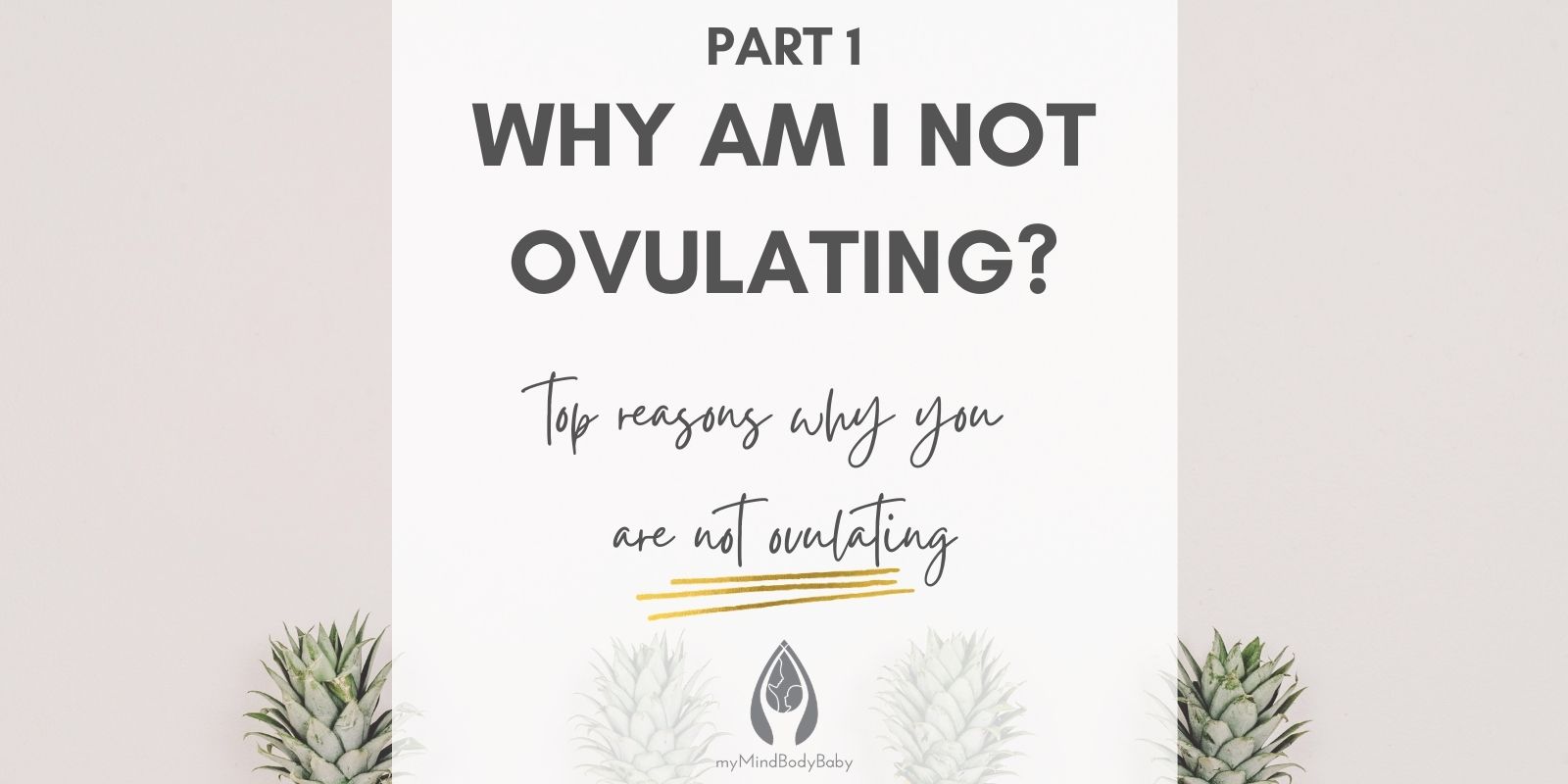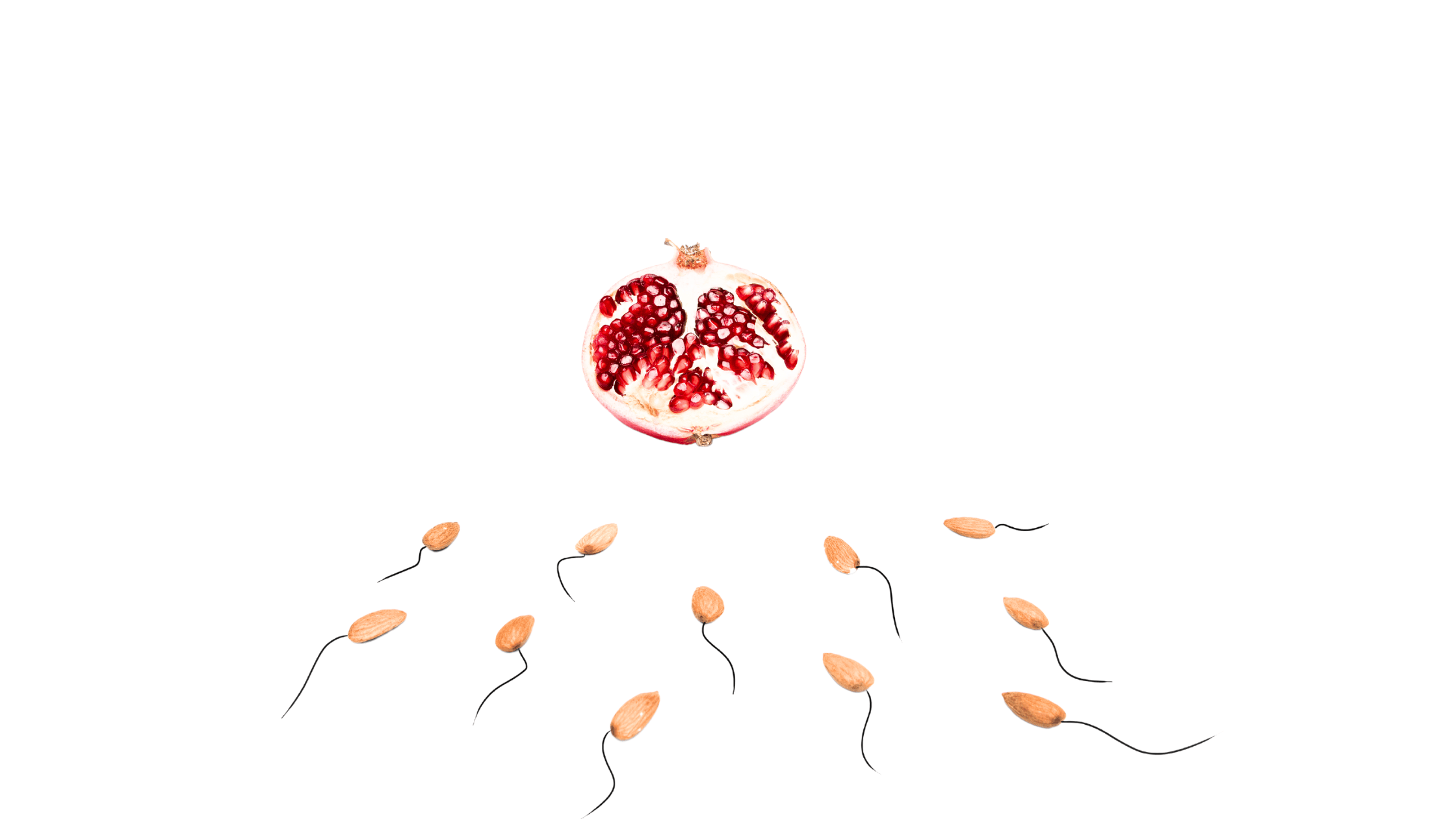“Why Am I Not Ovulating? Part 1” | myMindBodyBaby
We get this question A LOT, which makes sense, as according to the Mayo Clinic, approximately 1 in 4 couples struggling with infertility will struggle due to ovulation disorders. In these cases, ovulation is happening irregularly and or infrequently, or not at all – and this is called anovulation.

What is ovulation?
Ovulation is when an egg is released from the ovary. A rise in follicle stimulating hormone (FSH) helps the egg mature and once mature luteinizing hormone (LH) triggers the release of this egg.
Once released (ovulation) the egg travels down the fallopian tube to potentially encounter sperm to fertilize the egg. At this point, women will have a marked increase level in the hormone progesterone. If progesterone levels are rising, this generally suggests ovulation has occurred.
In the instances of anovulation, there is zero chance of conception in that cycle as there is no egg to be fertilized. When a woman has infrequent or irregular ovulation, there are fewer chances to achieve pregnancy, as she is ovulating less often.
![]()
At-Home Ways to Identify Ovulation
- Tracking your period/Ovulation Calculator. Ovulation occurs between days 10-17 for about 30% of women. If you knowingly fall into this group, you can use an ovulation calculator to track when you might be ovulating. More accurate ways of predicting ovulation are as follows.
- Basal Body Temperature (BBT). This involves taking your temperature each morning, recording it (we have created a tracker for you), and observing when it has been elevated for 3-4 days above your baseline temperature. The elevated days are a good indication that ovulation has or will occur. Use this free digital temperature tracker to get started.
- Changes in cervical mucus (CM). Now for the really sexy stuff. For purposes of conception cervical mucus is a fluid that’s purpose is to nourish and protect sperm as it enters the cervix and makes its way through the female reproductive tract, hopefully, to meet up with an egg. During ovulation, estrogen surges create a thicker, “egg-white-like” consistency of mucus. It is this texture that when identified, can signify ovulation.
- Over the counter ovulation predictor kit (OPK). These can usually be purchased at your local drug store or online. The process is similar to a pregnancy test whereas the test strip will detect the presence of Luteinizing Hormone in urine, indicating ovulation should occur within a few days.
- Sometimes subtle symptoms like breast tenderness, bloating, mild stomach pains, and or ovary pains (located generally on the side of the abdomen) can signify impending or current ovulation.
Note: timing of the fertile window is quite variable – even among women who describe their cycles as regular.
18]
What causes ovulatory disorders?
As a nutritionist, I often get asked “Is there a pill or supplement I can take to make me ovulate?”. The simple answer is no, there isn’t. What I want to encourage is for you to do a little digging to find the root cause of why you are not ovulating, and then treat the root issue.
Here are some of the most common reasons why women do not ovulate:
Polycystic Ovarian Syndrome (PCOS)
This endocrine disorder affects approximately 1 in 10 women. Your endocrine system (hormonal system) is like your internal communication network. It helps different areas of your body communicate with one another through chemical messages. When these internal messages get mixed up due to imbalances ovulation can become disrupted.
Hormonal disruptions are caused by many things – stress, poor diet (see below for a free PCOS fertility food guide), lack of sleep, environmental toxins (more here on this topic), just to name a few. So, if you not ovulating and have PCOS then it’s time to focus on the lifestyle changes that will help get your PCOS under control and in time hopefully ovulating again.
46]
If stress is an issue, try to identify what the main source of your stress is coming from? Too much on your plate? Are the expectations at work becoming too demanding? Self-care, while a super trendy topic these days, is actually super important. Taking your system from a 10/10 to a slightly calmer version can have beneficial impacts on your hormones.
Getting the perfect night’s sleep to help support hormonal balance.
Falling asleep is one of the biggest sleep complaints I hear, so finding a routine that you stick to each day is critical.
- When it starts to get dark outside in the evening shut off or lower overhead lights. Consider using just floor lamps and low lighting to allow your body to naturally produce the melatonin. This hormone helps relax the body and prepare it for sleep.
- The calming effects of magnesium is a great option 45-60 minutes before bed. This can be taken in tablet form or in powder in some warm water. Note: magnesium can cause loose stool so make sure you start at a low dose, around 100mg.
- Approximately 45-60 minutes before bed consider having a warm shower or bath. The warmth also helps to relax the body and mind.
- From here, get into bed and get old-school with a book or magazine. Please refrain from using your devices at this time, the blue light can be stimulating.
- Lastly, once the lights are off and you are ready to sleep, consider using some type of mindfulness or meditation to help turn off the brain. This has been shown in research to help reduce insomnia and fatigue. Specific to fertility, try this free Fertility Meditation Program.
*For more info on PCOS, read here

Hyperprolactinemia
Prolactin is a hormone secreted by the pituitary gland in the brain. It is most often associated with its role in stimulating lactation in postpartum women.
High prolactin levels can interfere with the hormone production of hormones like estrogen and progesterone, which in turn can change or stop ovulation.
So what to do?
Some medications can actually cause prolactin levels to rise. If this is the case, speak with your doctor about whether another medication could be right for you.
How healthy is your thyroid? Unmanaged hypothyroidism can also impact prolactin levels. If you are unsure, ask your doctor to run a complete thyroid panel that includes TSH, T3, T4, Reverse T3, and TPO Antibodies. If you have been diagnosed with hypothyroidism (sluggish thyroid), make sure this is well managed (see below under ‘Thyroid Disorders’ for lifestyle suggestions for managing your thyroid).
Zinc: This study showed that zinc can help to lower prolactin levels. Foods high in zinc include pumpkin seeds, hemp hearts, poultry, and red meat, chickpeas, lentils, cashews, mushrooms, and avocado. In addition, supplementing with additional zinc could be beneficial. Make sure you speak with your doctor about whether this is a good option for you.
Thyroid Disease
There are two main types of thyroid disease – hypothyroid and hyperthyroid.
Hypothyroidism is essentially an underactive thyroid gland. According to the American Thyroid Association, the most common reason for hypothyroidism is Hashimoto’s thyroiditis. This is when the body attacks its own tissues like the thyroid gland. When this is happening and unmanaged, certain sex hormones are not produced in adequate amounts to stimulate processes like the release of an egg (ovulation).
Convincing evidence is showing that once managed, ovulation can often resume (if this is the underlying reason for anovulation). In this one study “Of 394 infertile women, 23.9% were hypothyroid (TSH > 4.2 μIU/ml). After treatment for hypothyroidism, 76.6% of infertile women conceived within 6 weeks to 1 year.”
Hyperthyroidism is when there is an overactive thyroid gland. Symptoms include anxiety and nervousness, trouble sleeping, weight loss, and lighter, more infrequent menstrual cycles. Clearly, for those who are trying to conceive, these sporadic cycles can make timing quite difficult.
Supporting a healthy thyroid.
Thyroid health is a complex topic. While research has shown that genetics can play a role in thyroid disease, there are some key lifestyle factors you can take into consideration to help improve thyroid health in combination with the medical guidance you have been given.
Optimize your digestion.
A healthy digestive system is key for allowing your body to process and absorb important thyroid-friendly nutrients such as iodine, selenium, and zinc.

Outside of consuming foods rich in the above nutrients (once you get the go-ahead from your doctor), eliminating or reducing digestive-hindering processed foods is imperative. White flours, sugars, artificial sweeteners, and colours all need to go to make way for a digestive system that is working at its full capacity.
Also, simple things like chewing your foods really well and not drinking water with your meals are easy things you can do to give your body a little extra help in the digestive department.
If you get gassy, bloated, or have bowel issues, consider sorting these out sooner than later as they often signify that something isn’t quite right digestively.
Get a handle on stress.
Ya, ya, you’ve heard it before. Stress is bad.
While short term stress is a normal part of life, long term chronic stress can wreak havoc on the body creating impaired digestion, inflammation, taxed adrenals, weakened immune system, and thyroid problems.
*See the section below on Stress for some simple ways to start working towards a more calm state.
Reduce exposure to toxins.
Studies are showing links between thyroid conditions and contaminants in our environment. “Factors that increase autoimmune thyroid disease risk include radiation exposure, both from nuclear fallout and medical radiation, increased iodine intake, as well as several contaminants in the environment that influence the thyroid.”
While we cannot avoid all potentially harmful exposure, there is A LOT we can do to minimize contact with these substances. Check out this article where we go into depth on the impact chemicals and toxins are having on our health and how to take simple steps to drastically reduce this impact.
Obesity
Excess weight, especially fat around the belly, can lead to insulin resistance. Not only can this cause additional fat storage, but it can drive up levels of androgen hormones like testosterone and halt ovulation. One study found that obese women had a relative risk of ovulatory infertility of 3:1 compared with women of lower body weight.
Knowing all of this it won’t be a shock to learn that “weight loss programs through lifestyle modification in obese women, have been proven to restore menstrual cyclicity and ovulation and improve the likelihood of conception”, and “weight loss with a resultant improvement in ovulation, pregnancy outcome, self-esteem, and endocrine parameters is the first therapeutic option for women who are infertile and overweight.”
So what “diet” does one choose to lose weight?
We here at myMindBodyBaby have based all our meal plans and fertility support guides off of a Mediterranean way of eating. There is plenty of research to show the benefits of eating this way for fertility, and as a nutritionist for almost 13 years, I have also seen the weight loss potential in many clients.
For more information on our infertility support guides, click here.
Under Weight
Just as obesity can affect your fertility, so too can being underweight or having a low BMI.
Under 19: “Underweight”
19-24: “Normal”
25-29: “Overweight”
Over 30: “Obese”
While most of us understand that BMI is an imperfect measurement, and doesn’t necessarily speak to overall health as it doesn’t distinguish between fat (or the type of fat) and muscle, it is one simple parameter to help gauge if you are under or overweight.
In simplistic terms, a low BMI can affect a woman’s fertility in several ways. If too few calories are being consumed, the body can respond in such a way that non-essential systems, like reproduction, start to shut down. This is a survival mechanism built into our bodies from caveman days.
So one simple step you can take is to increase your intake of smoothies. They are an excellent way to consume quality calories without too much effort. Check out this free fertility-friendly smoothie download.
48]
Note: For women who struggle with eating disorders nutrient deficiencies can also impact the normal functioning of the menstrual cycle, halting or creating irregularities in ovulation. Seeking medical attention if this is something you struggle with is an important and courageous first step in this type of situation.
Extreme Stress
The effects of stress on the reproductive system are real. Our friends at @ivfphoenix summed it up nicely when they said “recent research tells us that stress boosts levels of stress hormones, such as adrenaline, catecholamines, and cortisol, which can inhibit the release of the body’s main hormone, GnRH (gonadotropin releasing hormone), which is responsible for the release of sex hormones. Subsequently, this may suppress ovulation in women, reduce sperm count in men, and lower libido in both women and men.”
So what can you do?
Sometimes just small adjustments in your day to day can make all the difference. Take a look at the list below. Is there anything you are open to trying?
While adding in new tools can provide extremely helpful to some, perhaps you are someone who needs to subtract something from your busy days. Can you hire someone to clean your home? Could you volunteer one night a week instead of two? For those who have too much on their plate, often a little more downtime to just be present can make the world of difference.
Tips for supporting stress:
- Acupuncture
- B Vitamins
- Sleep
- A diet that doesn’t include white processed flours and sugars*
- Mindfulness
- Gentle movement – check out this free yoga flow from our fitness expert Lyndsey
- Downtime to enjoy things that bring your joy – reading, hiking, etc.
38]
Low Ovarian Reserve
Low ovarian reserve is when there is a lower than expected number of antral follicles (follicles that have matured to a certain size) in the ovaries. Research has shown that the number of antral follicles one has left correlates to the total number of eggs left and therefore gives an indication of reproductive age. Essentially, if your antral number is low, there is a good chance that your total egg numbers are low too.
In addition, antral follicles produce higher levels of the anti-mullerian hormone (AMH), this is another way doctors can identify ovarian reserves.
Since antral follicle counts naturally decline as a woman ages, specialists are able to roughly determine what is normal and what is outside of typical in terms of follicle counts, and make assumptions about a woman’s reproductive potential.
Being diagnosed with a low ovarian reserve can be heartbreaking. Amanda G, age 35, knows this all too well. “I never in a million thought this is how it would be…. having babies should be easy right? It’s just disheartening knowing with each month and year, my body (or ovaries) is failing me. The one thing that stands out to me is when people say “you’re still so young”… but behind closed doors, there is so much more going on. Sometimes you just don’t have all the time we’d wish for.”
So, while we cannot control the number of eggs we produce, our lifestyle CAN impact the QUALITY of these precious little eggs. Check out this article for information about this!

A personal note from me.
While follicle counts are an indicator of how many eggs you have and therefore an important measurement of fertility potential, it is not absolute in whether you conceive or not. We understand a diagnosis of low ovarian reserve can be devastating. If you have received this diagnosis speak with your doctor about all of your options moving forward. Do not give up hope!
Premature Ovarian Insufficiency
Very simply, premature ovarian insufficiency (POI) is the loss of normal functioning of the ovaries before the age of 40. Alongside this, ovarian failure is characterized by higher levels of follicle stimulating hormone (FSH) and reduced estrogen.
Common symptoms of premature ovarian failure include:
- Irregular or skipped periods
- Night sweats
- Dry eyes
- Decreased sexual desire and vaginal dryness
- Irritability
- Hot flashes
- and difficulty achieving pregnancy
Accepted causes of ovarian failure are chromosomal defects, toxins, and as a side effect of an autoimmune disease. There are also cases that unfortunately have no clear explanation.
So how is this treated?
Estrogen plays a vital role in the menstrual cycle and the ability to conceive. Those with ovarian failure generally have inadequate levels of estrogen. Restoring estrogen balance with hormone therapy is widely accepted as the most common method of treatment.
Another emerging option is acupuncture. This small study by Chen et al. (Tianjin University and Chinese Medical Sciences, Beijing), followed women with POI who were given acupuncture treatments once every other day for 3 months. The results were interesting, to say the least – serum FSH decreased, estradiol (E2) decreased, almost 20% of participants resumed their menstrual cycle, and participants reported less anxiety and mental stress using a self-rated anxiety scale.
So what’s next?
There are many different reasons why a woman may struggle with ovulation. In part two of this article, we will discuss additional ways that lifestyle can help support overall health and hopefully lead to reproductive improvements. Additionally, we will answer common questions about ovulation submitted to us from our amazing online community!
Stay tuned.




